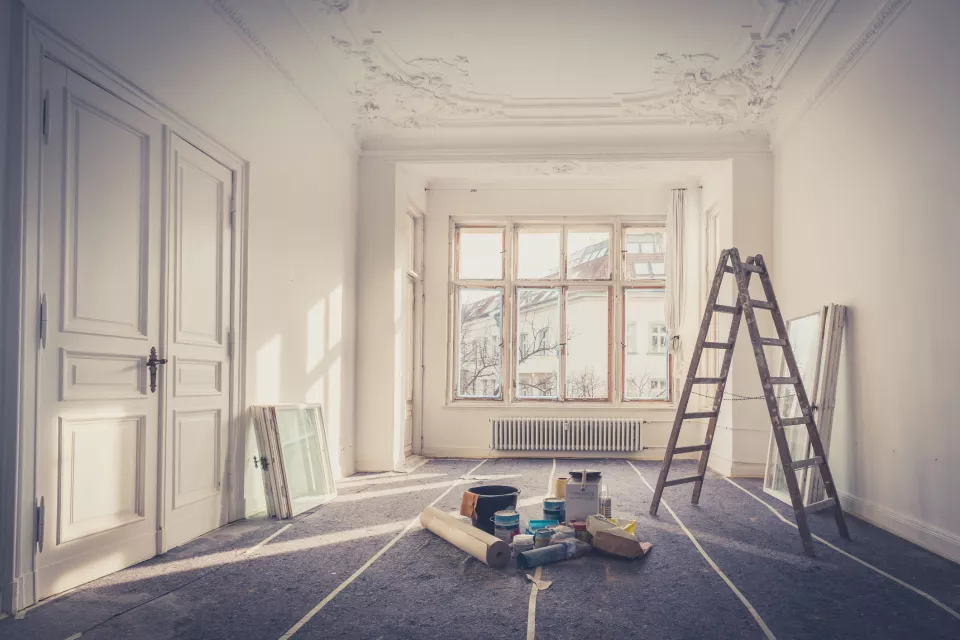
The house flipping principle is simple: you buy a house with potential, renovate it to increase its value and then sell it shortly afterwards. Put like that, this looks like an easy way to make money. But what is the reality? BuyerSide, your real-estate purchasing consultant, looked into the issue.
The rise in real-estate prices and the supply of properties for renovation in Belgium
Real-estate prices have soared in Belgium recently and turnkey properties are particularly popular among families who do not wish to have to deal with construction or conversion work or investors looking to diversify their assets without having to devote time to it.
Meanwhile, the country has a fairly large supply of properties in need of renovation. In Flanders, for example, over two million homes will have to be adapted to meet the required standards by 2040, while the figures are 570,000 by 2050 in Brussels and one million by 2050 in Wallonia.
An analysis of these two elements reveals that the demand for houses that do not require work is substantial, as is the supply of properties in need of renovation. At first glance, buying a house to be renovated therefore seems like a good idea if you feel ready to fix it up and then resell it to make a certain amount of profit.
House flipping: the elements to take into account for a profitable real-estate investment
On the face of it, the idea of fixing up a house and then reselling it to benefit from the added value seems tempting. However, many different elements have to be taken into account when calculating your investment.
Registration duties
If you buy a house then then resell it within two years, you can recover three-fifths (Flanders and Wallonia) or 36% (Brussels) of the registration duties, whether it is your main or a secondary residence. In Flanders only, if you buy another property as your main residence within this two-year period, you can recover the remaining two-fifths.
Capital gains tax upon resale
The capital gain corresponds to the difference between the purchase price and the sale price.
If you resell your house and it is your main residence, you do not have to pay capital gains tax. However, if it is not your main residence and you sell it again within five years of purchase, you will then pay a tax if you sell it for a higher price than you purchased it.
If house flipping is your main activity, your earnings will thus be taxed as personal income tax. If this is not your main activity, but you buy, renovate and resell regularly, you will have to pay capital gains tax equal to 33%. And finally, if this is a one-off event, you will be liable for capital gains tax of 16.5%.
You are, however, authorised to increase the purchase price by a fixed rate of 25% (whereas the real costs linked to purchasing property rarely amount to more than 15% (registration duties + notary costs + credit costs, etc.)). In addition, 5% can be added in extra fixed costs for each year that you own the property. If you call upon a contractor to do the work, the costs incurred can be added to the purchase price.
| Real costs | Fixed costs | |
|---|---|---|
| Purchase price | 100 | 100 |
| Purchase costs | 15 | 25 |
| Year 1 | 0 | 5 |
| Year 2 | 0 | 5 |
| TOTAL | 115 | 135 |
After owning the property for two years, the capital gain therefore needs to be more than 15% before it is liable for tax. This is very rare, given that property developers/professional property traders buy products on the basis of a projected capital gain of 10 to 15% (depending on the risk).
So you would need to do better than them, as a private individual, for the tax to apply.
VAT at 6% for properties in need of renovation
Rather than doing everything yourself, we advise you to call upon professionals for some of the more technical jobs. You will benefit from guarantees on these jobs and VAT of just 6% applies for renovation work, under certain conditions.
Your real-estate investment budget
You have two options when investing in house flipping:
- To invest part of your savings: you will need to set aside a reserve for the renovation work and have sufficient resources if you encounter problems during the transformations. The risk when investing a substantial sum in a single property is relatively high.
- Taking out a loan: in this case, you will have to take account of your bank’s financing conditions. In addition, do not forget the costs and taxes resulting from this loan. We therefore advise you to examine these costs and the potential revenue carefully.
The time factor
Renovation requires a great deal of time, involvement, discipline and patience before obtaining a capital gain.
Your skills
If you are not skilled at manual work and have to hire numerous different professionals, you will lose much of your potential added value.
Would you like to invest in house flipping and do you need the advice of real-estate acquisition experts?
